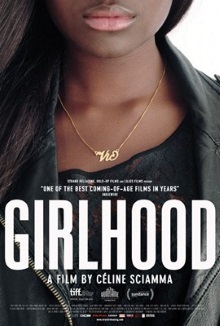
As I’ve said before, since I actually speak French, I’m more inclined than usual to add French films to our watch list but Bande de Filles, released as Girlhood in English-speaking markets, shouldn’t need this extra consideration. With its subject of female African-French teenagers living in the outskirts of Paris, it promises to cover some of the same territory as the eye-opening La Haine by Matthieu Kassovitz. As its director Céline Sciamma commented, black women almost never appear in French films so it feels great just to break this informal taboo.
Marieme is a 16-year-old who struggles at school while at home she is abused by her older brother. Her mother appears to be single-handedly raising the family which also includes two younger sisters and as she is often absent due to work, her brother acts as the patriarch figure. After being forced onto a vocational track due to her poor grades she falls in with a local gang of girls. Though she does so initially to attract the attention of a boy she has a crush on, it quickly becomes evident that the group provides her with a sense of identity and the respect of a peer group that she had been missing. Under the aegis of the gang and particularly their leader Lady who shows her dominance by fighting with girls from other gangs, she learns to commit petty crimes like shoplifting and extortion. At the same time however she learns a measure of self-confidence and the strength to pursue what she wants for herself, even if she isn’t quite sure what it is that she wants.
It makes for a rich premise, one that I might be tempted to cynically say seems pitched in just the right way to win awards. Unfortunately, like the other two films we’ve watched this week, this one is yet another instance of good, but not quite good enough. Sciamma often relies too much on the music to do the storytelling for her. Using Rihanna’s Diamonds to demonstrate female empowerment is pretty great, allowing the whole song to play out feels like just filling in time as the scene starts to drag. Other times the characters talk about key moment rather having the audience see it for themselves, as when the girls talk about visiting Disneyland, apparently an important bonding moment. The film opens with a scene of Marieme playing rugby, a hip track playing in the background, but nothing comes of it and we never see the sport or those friends again. Without a single scene of Marieme having an earnest conversation with her mother, it feels like a pivotal element of the film is just missing. Frustratingly, the film has no real ending, so that the character’s arc feels incomplete.
A more serious problem is that the film lacks authenticity and legitimacy. Sciamma is a white French woman and while it’s great that she wanted to make a film about African-French girls, there’s a frustrating lack of groundedness in the film that I suspect stems from her only borrowing that background. Sciamma is an African-French but which African country were her ancestors from originally? Does it matter? Considering that the girls are differentiated into gangs and that their familial customs aren’t exactly that of white French people, I think it does. There are tantalizing hints that her brother acts as a guardian for Sciamma’s sexuality. Does this mean that her family is Muslim? We don’t know and we never so much as see a hijab. For a film in which identity in all of its forms, black, female, youth, is so important, the lack of these defining details is a serious fault. It also casts doubt on details such as whether or not black girls in the banlieues really engage in organized fights to establish dominance.
While Bande de Filles isn’t as good as I’d hoped, there’s still plenty to like. There are moments when it feels like it’s going to fall into the usual tropes but then it manages to surprise you. For example when Sciamma extorts petty cash from her fellow students at the behest of the other girls, you can’t help but think to yourself, “Yeah, this is going to be one of those stories.” But when you see the girls pool their cash to rent a hotel room just so that they can have a place of their own to hang out for one day, it’s hard to be upset at them. Even up to the end, the film never treats Sciamma’s involvement with the gang as something altogether negative. Similarly, the usual expectations are inverted with Sciamma’s relationship with the boy she has a crush on.
In my book this means that despite its weaknesses Bande de Filles remains a film that is noteworthy and well worth watching. As a drama it’s both riveting and entertaining, plus it serves as a good reminder that France is more diverse than what is seen in most films and television shows.